 Nebrodi
Nebrodi
 This breed is
also called Nebrodi or Madonie black
swine. The presence
in Sicily of black swine is testified by the references of ancient writers, and
verified in the Greek-Carthage period (VII-VI cent. B.C.). It is rustic, almost
wild, always grazing in the woods, as fossil remains testify.
This breed is
also called Nebrodi or Madonie black
swine. The presence
in Sicily of black swine is testified by the references of ancient writers, and
verified in the Greek-Carthage period (VII-VI cent. B.C.). It is rustic, almost
wild, always grazing in the woods, as fossil remains testify.Today only some limited examples of this breed are reared wild in Madonie and Nebrodi mountains.
Precocious and long-lived breed it is characterized by a peculiar fertility and a great number of weaned piglets. This breed is also resistant to diseases and to the inclemency of the weather, being able to appreciate poor food as well. Its meat, either used fresh or to make sausages, gives high quality products.
The ...

 Neijiang
Neijiang
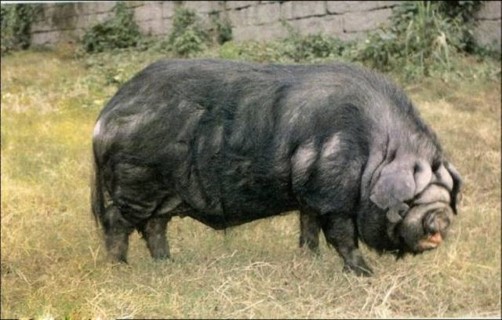 Neijiang Pigs, renowned for their large size, thrive in the mild climate and fertile agricultural landscapes of Southwest China''s Sichuan Basin. This region boasts well-developed agriculture and abundant feed resources, providing an optimal environment for the rearing of these robust pigs. With ample access to nutritious feed and favorable climatic conditions, Neijiang Pigs flourish, contributing to the rich agricultural heritage of the area.
Neijiang Pigs, renowned for their large size, thrive in the mild climate and fertile agricultural landscapes of Southwest China''s Sichuan Basin. This region boasts well-developed agriculture and abundant feed resources, providing an optimal environment for the rearing of these robust pigs. With ample access to nutritious feed and favorable climatic conditions, Neijiang Pigs flourish, contributing to the rich agricultural heritage of the area.

 Ningxiang
Ningxiang
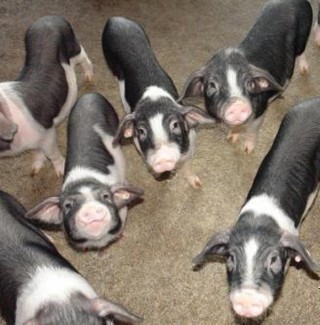 Ningxiang Pigs, originating from the Hunan Province of China nestled within the Central Subtropic belt, are renowned as lard pigs with distinctive features. These pigs are typically nurtured and fed by hand throughout the year, reflecting the meticulous care they receive from their handlers.
Ningxiang Pigs, originating from the Hunan Province of China nestled within the Central Subtropic belt, are renowned as lard pigs with distinctive features. These pigs are typically nurtured and fed by hand throughout the year, reflecting the meticulous care they receive from their handlers.
Their striking appearance is marked by a unique hair coat color pattern, often likened to "black clouds overhanging snows" with a distinguished silver ring encircling the neck. Their physique is characterized by a slightly concave back and a pouched, pendulous belly, contributing to their distinctive appearance. Notably, Ningxiang Pigs boast a substantial layer of back fat, measuring approximately 4 cm in thickness.
In terms of rep ...

 North Caucasian
North Caucasian
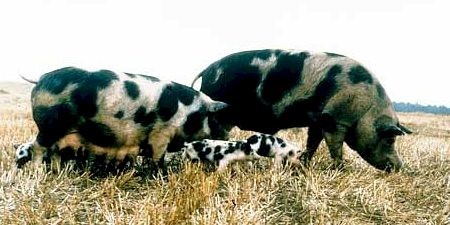 North Caucasian Pigs are a
general purpose pig breed from Russia and Uzbekistan.
North Caucasian Pigs are a
general purpose pig breed from Russia and Uzbekistan. At that time in the North Caucasus, the local Kuban pigs were bred mainly with strong constitution and adaptability to local conditions and pasture content, satisfactory multiparty and good maternal qualities. However they were slow to mature. Therefore, it was decided to keep everything valuable from local Kuban pigs, but with early maturity and improve meat qualities. And also more adaptability to cold climate and the ability to use the maximum amount of juicy and coarse fodder.
North Caucasian pigs were created through complex reproductive crosses of local Kuban pigs with Large White, Berkshire, and White Short-breed breeds. ...

 North Siberian
North Siberian
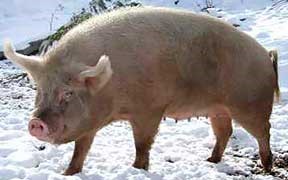 North Siberian Pigs are a
medium sized general purpose pig breed from Russia. They were developed in
Novosibirsk Oblast in Russia in the 1940s. They were developed by crossing the
short-eared Siberian pigs with Large White boars; the North Siberian was bred
for a dense bristle covering and undercoat to increase hardiness to the harsh
climate of northern Siberia. Adult males typically reach 312kg in size.
North Siberian Pigs are a
medium sized general purpose pig breed from Russia. They were developed in
Novosibirsk Oblast in Russia in the 1940s. They were developed by crossing the
short-eared Siberian pigs with Large White boars; the North Siberian was bred
for a dense bristle covering and undercoat to increase hardiness to the harsh
climate of northern Siberia. Adult males typically reach 312kg in size.The North Siberian is a white breed, and multicolored specimens rejected during the breeding program were used in the development of the Siberian Black Pied breed.

 Norwegian Landrace
Norwegian Landrace
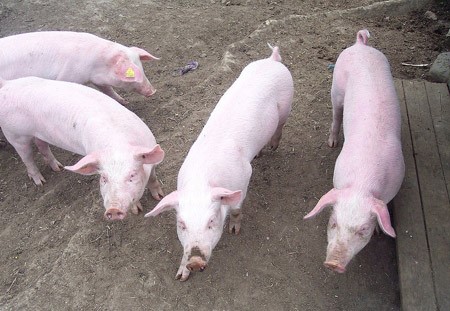 Norwegian Landrace Pigs are the leading breed of swine
in Norway. They are white and have a heavy drooped ear.
Norwegian Landrace Pigs are the leading breed of swine
in Norway. They are white and have a heavy drooped ear.Since swine are not as numerous in Norway as in most countries that have a registered strain, the number registered each year is limited. Norwegian Landrace, as well as most of the swine in Norway, are raised in the southern part of the country. Most are found in the area of Hamar.
Norwegian Landrace Pigs originated from importations of Landrace from other countries. There was special selection to give the blend of introduced strains a unique adaptation to the environment of Southern Norway. The major aid in this selection has been the breed testing done in a special swine station. In the boar testing ...
